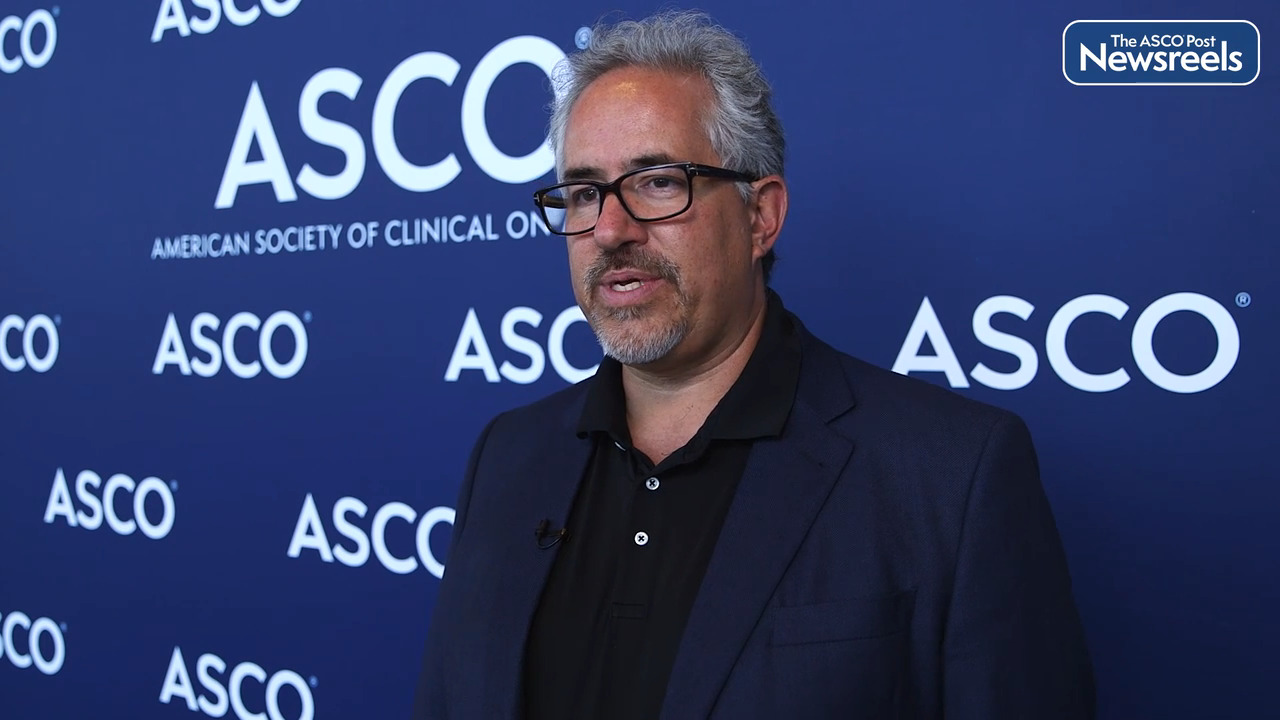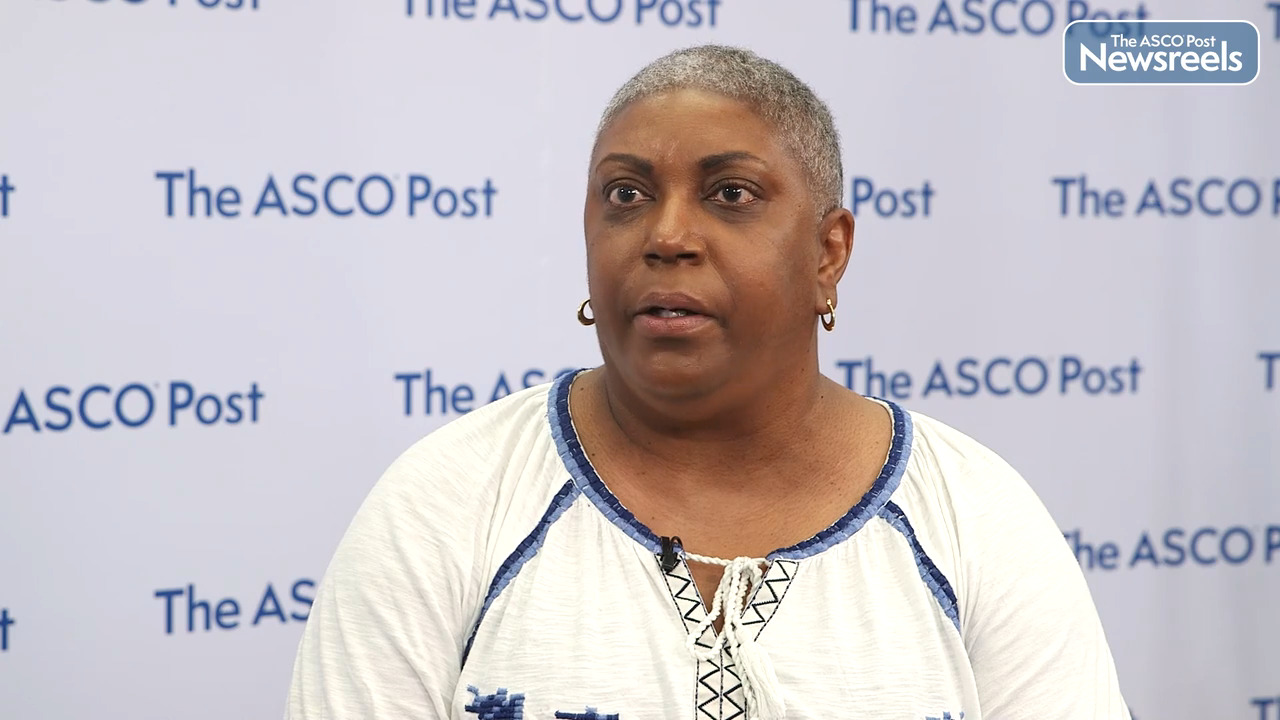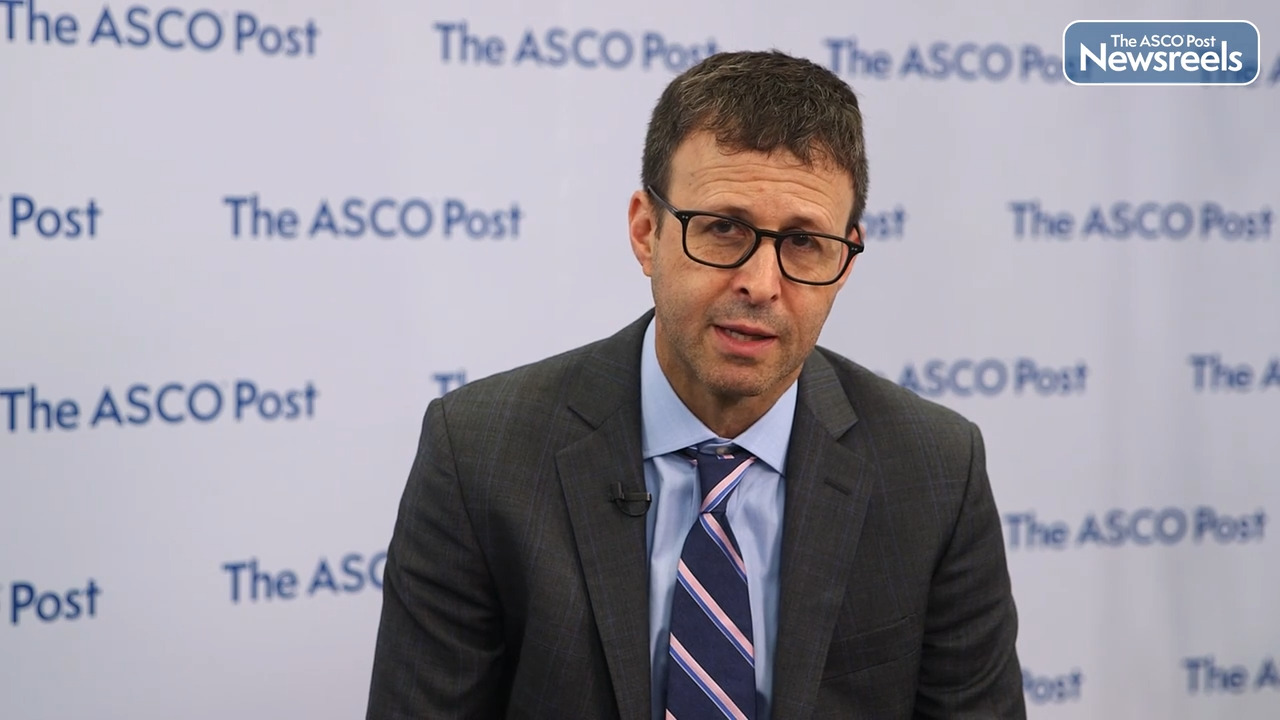Transcript
Disclaimer: This video transcript has not been proofread or edited and may contain errors.
Lisa Carey: Hope. Thanks so much for joining us here at ASCO Post to talk about the TROPiCS-02 presentation that you did at ASCO this year.
Hope Rugo: Thanks for your interest.
Lisa Carey: Oh, it's wonderful. So can you just, for everyone, let's frame a little bit the nature of TROPiCS-02, the intervention, and who the population is that was studied.
Hope Rugo: Yes, I think that's really important to understand the results. So an initial Phase I study looked at sacituzumab govitecan, not just in triple negative disease, which of course led to the ASCENT trial. But in patients who had refractory hormone receptor-positive HER2-negative metastatic disease we'll refer to as hormone receptor-positive. And in those patients, the progression-free and overall survival, as well as the response, were quite impressive, so that led to the development of TROPiCS-02. So the trial was designed to treat patients who had developed progressive disease on endocrine therapy, including a CDK4/6 inhibitor. So actually, it's unique in the chemotherapy trials and that everyone was required to have had it in some setting, and most had it in the metastatic setting, 98%. And then they also had to have received at least two lines of chemotherapy, including a taxane at any stage, and up to four lines. Although a few patients had up to eight lines, very small number. They're included in the intent to treat. So these are patients who have very chemotherapy, and endocrine, and targeted therapy resistant hormone receptor-positive metastatic disease. And indeed, that was reflected in the fact that 98% of the patients had visceral disease, which is what we see now in patients who are progressing with hormone receptor-positive breast cancer, and where the options are quite limited. And our thinking here was that it's single agent sequential chemotherapy, and the treatment duration is shorter and shorter as you get farther along, our options are limited, there's more toxicity. And so we're really looking for an alternative that might have better efficacy.
Lisa Carey: Yeah. And I think that's hugely important in understanding this trial, because you've got hormone receptor-positive HER2-negative metastatic disease, which has Trop-2 on it, so it's a rational antibody drug conjugate approach. And you've got a really remarkable population, CDK4/6 inhibitor resistant, prior endocrine, an average of three prior chemotherapies. And now they go into the TROPiCS-02 randomization, which is sacituzumab govitecan, versus treatment of physician's choice. Talk a little bit about the control arm.
Hope Rugo: Well, so the randomization is one-to-one in this patient population from TROPiCS-02, and patients could have received a course sacituzumab given day one, and day eight, every 21 days, or chemotherapy of physician choice, treatment of physician choice, essentially. And from that, we picked chemotherapy regimen agents that are listed in all of the guidelines as sort of chemotherapy options for these patients. And we figured a lot of patients would've received capecitabine, but it was an option. You couldn't get the same chemo again that your cancer had already progressed on, that would obviously bias your results a lot. And so capecitabine, gemcitabine, vinorelbine, and eribulin were the options for treatment. And we did suspect that many patients would receive eribulin, since it's generally used as a late-line agent. And in fact, just a little under 50% of patients received eribulin as their treatment of physician choice. But again, that's because the majority of patients have received capecitabine in their pretreatment lines.
Lisa Carey: And what about the results?
Hope Rugo: Well, thinking about the results, it's important to think about what the population actually represented. And as I mentioned, the majority of patients had had capecitabine, but more than 50% had had at least three lines of prior chemotherapy. The median was three, with a range of zero to eight, so this is really a lot of chemo treated patients. And in the progression-free survival curves, we saw evidence of that, where there was this early drop-off, where patients, regardless of what arm they were on, in that two months, had this rapid disease progression. And we see that in clinical practice, whether it's brain mets, or whatever the issue is that results in progression. Despite that, we saw a significant improvement in progression-free survival from four to 5.5 months with chemo, versus sacituzumab with a hazard ratio 0.66. And the trial was powered for hazard ratio 0.7. So the hazard ratio 0.66 was better, at 34% relative improvement, and highly statistically significant, so .0003. So even though it's interesting when we look at these curves, you have that initial drop-off, and then the curves separate and stay separated over time. So because of that, we also did landmark analyses, which I think can be very helpful in educating us as clinicians about how we want to use drugs, because we want patients to be able to stay on their therapy for as long as possible. And at one year, three times more patients were on progression-free without death on the sacituzumab arm, compared to the chemo arm. It was 21% versus 7%. So to me that was a very clinically relevant endpoint, and it was supported by the fact that response and clinical benefit rate, as well as duration of response, were all longer with sacituzumab compared to chemo.
Lisa Carey: Yeah. And I think that your landmark analysis really addresses a key thing, which is in this heavily pretreated group, although the PFS difference was only about a month and a half, in this setting, that's actually quite a lot. And I know it's too early. The overall survival is interim analysis, the first one, and it wasn't significant, but that's coming I'm sure. And I do think this trial, like others, just highlights that we're moving towards giving cytotoxics as ADCs pretty much as the preferred direction. Would you agree with that?
Hope Rugo: I do. And I think one of the comments that came out of the presentation, which I think is an important one, and it was an advocate twitter aligned, was that ADCs are chemotherapy, right? So there is toxicity from all of these ADCs. We saw data on other ADCs yesterday, where there's a lot of nausea compared to not giving that a particular ADC. So we need to balance the benefit and risk, but I think that in general, ADCs have a toxicity profile that's very reproducible and expected, and by prophylaxing and understanding that we can manage it, they seem to be overall more effective way of delivering cytotoxic chemo. Somebody also asked, "Why not just give the naked drug?" And you know, the way ADCs are developed is you have a drug that's too toxic to give as a naked drug. So you have something that's got a big bang for the buck, so to speak, and those drugs can't be given. They were always effective, but too toxic. So now you attach them to an ADC, and you have this remarkable advance in drug delivery. And the other thing I think is fascinating is this is all true of the current generation ADCs. We don't know enough about the importance of drug-to-antibody ratio, so-called DAR, but there's something unique about the linker and the delivery systems in these third generation ADCs that make them highly effective. So I agree. We are making a shift.
Lisa Carey: Yeah. Well, thank you. Thank you so much for your presentation, and thank you for helping frame it for the ASCO Post.
Hope Rugo: Thank you very much.





